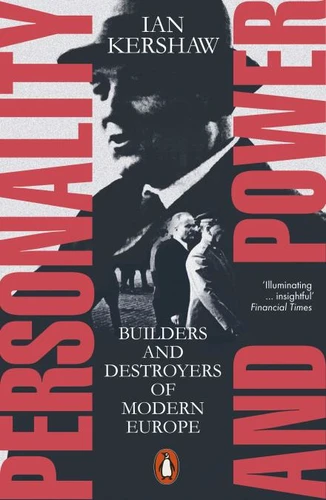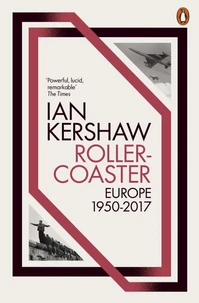Personality and Power. Builders and Destroyers of Modern Europe
Par :Formats :
Disponible dans votre compte client Decitre ou Furet du Nord dès validation de votre commande. Le format ePub protégé est :
- Compatible avec une lecture sur My Vivlio (smartphone, tablette, ordinateur)
- Compatible avec une lecture sur liseuses Vivlio
- Pour les liseuses autres que Vivlio, vous devez utiliser le logiciel Adobe Digital Edition. Non compatible avec la lecture sur les liseuses Kindle, Remarkable et Sony
- Non compatible avec un achat hors France métropolitaine
 , qui est-ce ?
, qui est-ce ?Notre partenaire de plateforme de lecture numérique où vous retrouverez l'ensemble de vos ebooks gratuitement
Pour en savoir plus sur nos ebooks, consultez notre aide en ligne ici
- Nombre de pages512
- FormatePub
- ISBN978-0-14-199824-4
- EAN9780141998244
- Date de parution29/09/2022
- Protection num.Adobe DRM
- Infos supplémentairesepub
- ÉditeurPENGUIN
Résumé
One of the great historians of our age asks: how far can a single leader alter the course of history?The modern era saw the emergence of individuals who had command over a terrifying array of instruments of control, persuasion and death. Whole societies were re-shaped and wars fought, often with a merciless contempt for the most basic norms. At the summit of these societies were leaders whose personalities had somehow given them the ability to do whatever they wished.
Ian Kershaw's new book is a compelling, lucid and challenging attempt to understand these rulers, whether operating on the widest stage (Lenin, Stalin, Hitler, Mussolini) or with a more national impact (Tito, Franco). What was it about these leaders and the times they lived in that allowed them such untrammelled and murderous power? And what brought that era to an end? In a contrasting group of profiles, from Churchill to de Gaulle, Adenauer to Gorbachev, and Thatcher to Kohl, Kershaw uses his exceptional skills to think through how other, strikingly different figures wielded power.
Ian Kershaw's new book is a compelling, lucid and challenging attempt to understand these rulers, whether operating on the widest stage (Lenin, Stalin, Hitler, Mussolini) or with a more national impact (Tito, Franco). What was it about these leaders and the times they lived in that allowed them such untrammelled and murderous power? And what brought that era to an end? In a contrasting group of profiles, from Churchill to de Gaulle, Adenauer to Gorbachev, and Thatcher to Kohl, Kershaw uses his exceptional skills to think through how other, strikingly different figures wielded power.
One of the great historians of our age asks: how far can a single leader alter the course of history?The modern era saw the emergence of individuals who had command over a terrifying array of instruments of control, persuasion and death. Whole societies were re-shaped and wars fought, often with a merciless contempt for the most basic norms. At the summit of these societies were leaders whose personalities had somehow given them the ability to do whatever they wished.
Ian Kershaw's new book is a compelling, lucid and challenging attempt to understand these rulers, whether operating on the widest stage (Lenin, Stalin, Hitler, Mussolini) or with a more national impact (Tito, Franco). What was it about these leaders and the times they lived in that allowed them such untrammelled and murderous power? And what brought that era to an end? In a contrasting group of profiles, from Churchill to de Gaulle, Adenauer to Gorbachev, and Thatcher to Kohl, Kershaw uses his exceptional skills to think through how other, strikingly different figures wielded power.
Ian Kershaw's new book is a compelling, lucid and challenging attempt to understand these rulers, whether operating on the widest stage (Lenin, Stalin, Hitler, Mussolini) or with a more national impact (Tito, Franco). What was it about these leaders and the times they lived in that allowed them such untrammelled and murderous power? And what brought that era to an end? In a contrasting group of profiles, from Churchill to de Gaulle, Adenauer to Gorbachev, and Thatcher to Kohl, Kershaw uses his exceptional skills to think through how other, strikingly different figures wielded power.













